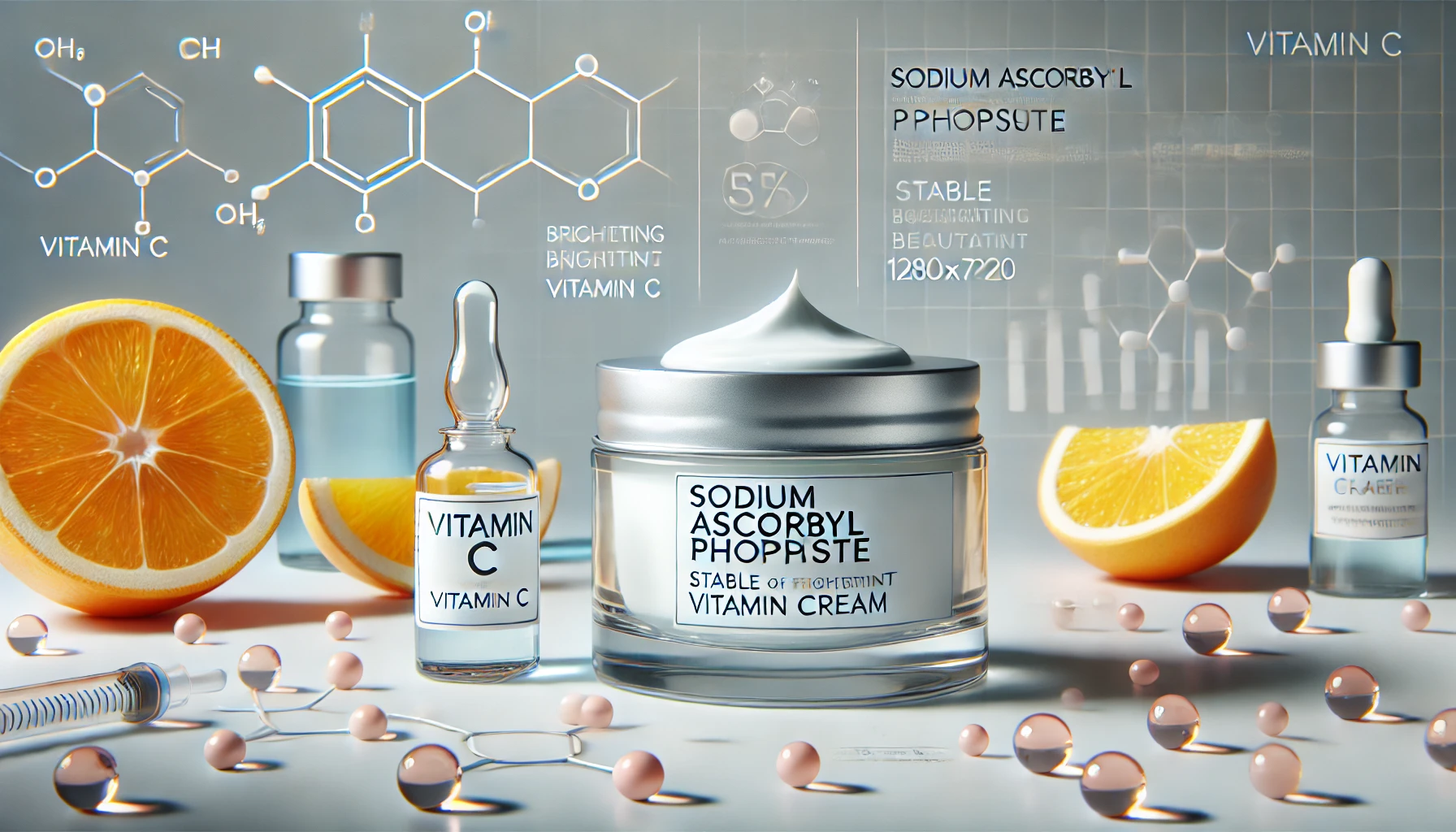Sodium Ascorbyl Phosphate (SAP) in Facial Cream – The Skin-Safe Vitamin C You Need

বাংলা পোস্ট
We all know the magic of Vitamin C when it comes to glowing, youthful skin. But not all forms of Vitamin C are created equal. While L-Ascorbic Acid is powerful, it can be irritating and unstable—especially in cream formulations.
That’s where Sodium Ascorbyl Phosphate (SAP) steps in—a gentler, more stable, and highly effective Vitamin C derivative that works beautifully in facial creams.
In this post, we’ll dive into:
-
🌿 What is SAP and how does it differ from traditional Vitamin C?
-
🧴 Why is SAP essential in facial cream formulations?
-
💧 Key benefits for skin health and appearance
-
🧪 How to use SAP in DIY or commercial facial creams
-
🔍 SEO keywords to drive your skincare content or product visibility
🌱 What is Sodium Ascorbyl Phosphate (SAP)?
Sodium Ascorbyl Phosphate (SAP) is a water-soluble, stable form of Vitamin C, derived from Ascorbic Acid. It’s specially formulated to be less reactive and more skin-friendly, making it ideal for:
-
Sensitive skin
-
Acne-prone skin
-
Long-lasting skincare products
Unlike regular Vitamin C, SAP doesn’t oxidize quickly and doesn’t require a low pH to work—making it perfect for creams, lotions, and serums.
✅ SAP is enzymatically converted into active Vitamin C in the skin, providing all the benefits without the irritation.
✅ Why Use SAP in Facial Cream Formulation?
Your facial cream should do more than just moisturize. With SAP added, it becomes a multi-functional powerhouse that can:
-
Brighten skin tone
-
Fight acne and inflammation
-
Stimulate collagen production
-
Protect against environmental damage
-
Improve overall skin texture and tone
Whether you’re a DIY formulator or a skincare brand, SAP is the Vitamin C your cream needs to stand out.
🌟 Top 6 Benefits of SAP in Facial Creams
1. ✨ Brightens Skin Naturally
SAP reduces melanin production by inhibiting tyrosinase, the enzyme responsible for pigmentation. As a result, it helps:
-
Fade dark spots
-
Even out skin tone
-
Improve overall radiance
-
Reduce dullness
2. 💧 Boosts Collagen Production
Vitamin C plays a key role in collagen synthesis, and SAP retains this benefit. With regular use, SAP-enriched creams can:
-
Firm the skin
-
Minimize fine lines and wrinkles
-
Restore youthful bounce
3. 🛡️ Antioxidant Defense Against Pollution and Sun
SAP protects the skin from oxidative stress caused by:
-
UV exposure
-
Free radicals
-
Environmental pollutants
While not a sunscreen, it complements SPF by reducing damage from sun exposure.
4. 🔬 Fights Acne and Reduces Breakouts
SAP has antibacterial properties, making it especially effective for acne-prone skin. It helps:
-
Reduce acne-causing bacteria
-
Calm inflammation
-
Prevent post-acne marks and scarring
5. 🌿 Gentle Yet Effective for All Skin Types
Unlike harsh actives, SAP is:
-
Non-irritating
-
Non-sensitizing
-
Safe for daily use
-
Suitable for dry, oily, and sensitive skin
6. 🧴 Stable and Long-Lasting in Creams
Because of its chemical stability, SAP maintains its potency over time. No more worrying about your Vitamin C cream turning brown or losing effectiveness after a few weeks.
🧴 How to Formulate a Facial Cream with SAP
✅ Recommended Usage Rate:
| Product Type | SAP Usage (%) |
|---|---|
| Daily face cream | 2% – 5% |
| Brightening serum | 5% – 10% |
| Spot treatment gel | Up to 15% |
Start with 2–3% for daily creams, and increase gradually based on skin tolerance and formulation needs.
✅ When to Use:
-
Apply morning and/or night
-
Use after cleansing and toning
-
Follow with SPF during the day
-
Combine with hydrating and soothing ingredients
✅ Best Ingredient Pairings with SAP:
| Ingredient | Benefit |
|---|---|
| Hyaluronic Acid | Deep hydration and plumping |
| Niacinamide | Enhanced brightening and anti-inflammatory |
| Zinc PCA | Sebum control and acne prevention |
| Panthenol (B5) | Skin barrier repair |
| Aloe Vera | Calming and soothing effect |
🧪 DIY SAP-Infused Facial Cream Recipe
Ingredients:
-
45 ml distilled water
-
5 ml jojoba oil or grapeseed oil
-
5 ml emulsifying wax
-
1 g SAP (approx. 2%)
-
1 tsp aloe vera gel
-
0.5 ml preservative (e.g., Optiphen)
Steps:
-
Heat the water and oil phases separately (~70°C)
-
Combine both and blend until creamy
-
Cool below 40°C
-
Add SAP, aloe vera, and preservative
-
Mix thoroughly and store in a sterilized jar
✅ Use morning and night on clean skin for optimal glow and protection.
⚠️ Precautions and Pro Tips
-
✅ Use cosmetic-grade SAP for skincare formulation
-
✅ Perform a patch test before regular use
-
✅ Store the product in a cool, dark place
-
✅ Avoid combining with strong acids (AHA/BHA) unless properly formulated
-
✅ Use sunscreen when applying during the day
💬 Real Reviews from Users and Formulators
“SAP is the only form of Vitamin C that my skin tolerates. No stinging, and my dark spots are fading!”
“As a formulator, I love working with SAP—it’s easy to use, doesn’t oxidize, and customers see real results.”
✅ Final Thoughts – SAP: A Smarter, Safer Vitamin C for Your Facial Cream
Sodium Ascorbyl Phosphate is not just another Vitamin C option—it’s the future of brightening skincare.
If you want a facial cream that’s:
-
🌿 Brightening
-
💧 Hydrating
-
🔬 Acne-fighting
-
🧴 Long-lasting
-
🌞 Protective against UV and pollution
-
🧬 Youth-boosting
Then SAP is your go-to ingredient.
Whether you’re a DIY enthusiast or a skincare brand owner, incorporating SAP into your facial cream is a smart, stable, and science-backed decision your skin (and your customers) will thank you for.

One thought on “Sodium Ascorbyl Phosphate (SAP) in Facial Cream – The Skin-Safe Vitamin C You Need”